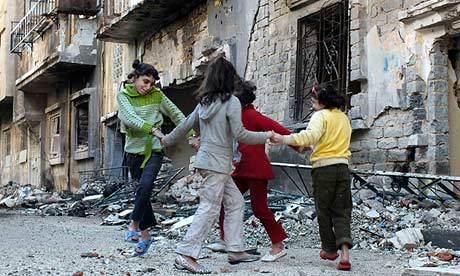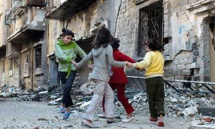Some 6.6 million children now need help in the region, the agency says, a figure that has gone up by a third, or about two million, since June 2013.
"That's an astonishing number and it's one that is rising very, very fast," UNICEF spokesman Simon Ingram told reporters in Geneva.
The organisation has so far only received 37 percent of the $770 million (566 million euros) it needs to cover its services until the end of the year for Syrian children both inside the country and living as refugees in neighbouring countries.
"There is actually a very real risk that as a result of this funding crisis and unless the money does come in we will be forced to discontinue some of the critical services that we are providing," Ingram said.
UNICEF is especially worried -- given the hot start to the summer in the region -- that it may soon have to halt water and sanitation services in Iraq, Lebanon and Jordan, which along with Turkey are hosting the lion's share of the Syrian refugees in the region.
Ingram stressed the potentially dire consequences of such a move in places where diseases could easily spread.
Of particular concern is polio, with thirty-six cases of the crippling and potentially fatal disease discovered in Syria this year. Two cases have been detected in Iraq, according to the UN.
Since the Syria conflict erupted in March 2011 more than 162,000 people have been killed and millions displaced.
In all, 10.9 million Syrians -- nearly half of the population of 22 million -- are in desperate need of humanitarian aid inside the country, according to UN figures. A full 5.1 million of them are children.
Another 2.9 million Syrian refugees, half of them children, also rely on emergency assistance in neighbouring countries to survive, with statistics showing 100,000 people fleeing the violence to join their ranks each month.
With the conflict showing no sign of abating, the UN expects the number of refugees in the region to rise to 3.6 million by the end of the year.
Also on Friday, the UN's refugee chief Antonio Guterres presented a revised plan for addressing the wider Syrian crisis, urging donors to cough up the rest of the $3.74 billion (2.75 billion euros) needed this year to help Syrian refugees across Lebanon, Jordan, Turkey, Iraq and Egypt.
So far, only $1.1 billion of the funds have been provided.
-----------------------------------------------------------------------------------------------------
"That's an astonishing number and it's one that is rising very, very fast," UNICEF spokesman Simon Ingram told reporters in Geneva.
The organisation has so far only received 37 percent of the $770 million (566 million euros) it needs to cover its services until the end of the year for Syrian children both inside the country and living as refugees in neighbouring countries.
"There is actually a very real risk that as a result of this funding crisis and unless the money does come in we will be forced to discontinue some of the critical services that we are providing," Ingram said.
UNICEF is especially worried -- given the hot start to the summer in the region -- that it may soon have to halt water and sanitation services in Iraq, Lebanon and Jordan, which along with Turkey are hosting the lion's share of the Syrian refugees in the region.
Ingram stressed the potentially dire consequences of such a move in places where diseases could easily spread.
Of particular concern is polio, with thirty-six cases of the crippling and potentially fatal disease discovered in Syria this year. Two cases have been detected in Iraq, according to the UN.
Since the Syria conflict erupted in March 2011 more than 162,000 people have been killed and millions displaced.
In all, 10.9 million Syrians -- nearly half of the population of 22 million -- are in desperate need of humanitarian aid inside the country, according to UN figures. A full 5.1 million of them are children.
Another 2.9 million Syrian refugees, half of them children, also rely on emergency assistance in neighbouring countries to survive, with statistics showing 100,000 people fleeing the violence to join their ranks each month.
With the conflict showing no sign of abating, the UN expects the number of refugees in the region to rise to 3.6 million by the end of the year.
Also on Friday, the UN's refugee chief Antonio Guterres presented a revised plan for addressing the wider Syrian crisis, urging donors to cough up the rest of the $3.74 billion (2.75 billion euros) needed this year to help Syrian refugees across Lebanon, Jordan, Turkey, Iraq and Egypt.
So far, only $1.1 billion of the funds have been provided.
-----------------------------------------------------------------------------------------------------









 Home
Home Politics
Politics











